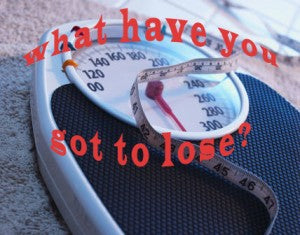Do you want to feel better and be more in control of your life in 2014?


- Write down what you eat in a notepad, a diary, or keep track in a phone application. Examples of popular phone apps are: “MyFitnessPal,” “Lose It!,” and “FatSecret.” Research from the American Journal of Preventive Medicine and from Kaiser Permanente show that people who track what they eat or keep a food diary are more successful at losing weight and even tend to lose twice as much weight as those who do not.
- Cook twice as much for dinner so you have lunch for tomorrow or dinner for another day. Also, take an hour or two on Sundays to plan and prepare meals for the week. This tip is a definite game changer in making eating healthy the easy choice for you!
- Cut fruits and vegetables the night before to have them ready for you to enjoy when you are looking for a snack.
- It is okay to have a slip-up. Slips are normal in any kind of lifestyle change. Do not let a slip up make you say, “I messed up so the whole day is ruined. I can eat whatever I want now.” Keep trying, be patient and do not be hard on yourself. Lifestyle changes take time. In order to make these changes permanent, it is important that you do not let one slip up bring you down.
- If you are going out for dinner - check the menu ahead of time and go in with a plan – or – share an entrée with someone and each order an individual garden salad or vegetable broth soup on the side.
- When serving yourself at home, at a work potluck or at a family party - start by serving half of your plate with a garden salad or green, non-starchy vegetables (ie. broccoli, asparagus & green beans). Next, serve your plate with lean protein (ie. skinless chicken breast, skinless turkey breast, lean pork loin, lean cuts of beef and fish). Lastly, fill in the rest of your plate with smaller portions of other sides. Do not deprive yourself; just have less/smaller portions of high sugary and highly processed foods and have them in moderation.
- Practice mindful eating. Chew slowly, eat slowly, put your fork down once in a while and enjoy every bite. Most people are used to eating so fast that when people gulp down their food, they can eat very fast and not feel full. As you regularly practice mindful eating, you will realize that you do not need as much food and it will also help you have a better relationship with food.
- Learn to manage stress. Stress is the perception that we do not have power. In fact, you do have power. The power is in how you respond to your stress. Step back, take a deep breath, and ask yourself, “Am I really in danger?” Then evaluate ways to problem solve and find ways that help you relax (ie. take deep breaths, go for a walk, go to the gym, take a yoga class, go on a hike, read a novel, de-clutter your home/room, etc.).
- Get regular physical activity. This is one of the keys to losing weight, having more energy, maintaining weight loss and in helping you to prevent disease.
- Get a good night’s sleep. Getting a good night’s sleep affects every aspect of your health. Not sleeping enough hours can affect weight management, can weaken your immune system and can disrupt your hormones, which regulate stress and hunger.
- Slow down. Slowing down can do wonders for you. Consider declining to attend a holiday party or two if you feel overcommitted. It is okay to say no to a social event – having time to yourself is very important; it will help you de-stress and recharge.
Leave a comment
Comments will be approved before showing up.
Also in Health & Beauty

Walking Toward Belonging: The Story of Huellas Latinas
In the heart of Minnesota, Huellas Latinas is redefining what it means to belong. Founded by Venezuelan urban planner Luisana Santibáñez, this inspiring organization connects Latino immigrants to nature through hiking, community, and healing. What began as one woman’s search for connection has grown into a statewide movement — empowering families to explore the outdoors, embrace wellness, and rediscover a sense of home beneath Minnesota’s open skies.

Why Working Out During Pregnancy Is Important!
Pregnancy is a transformative time in a woman’s life — physically, emotionally, and mentally. As much as I wanted to focus on the health of my baby, I learned it was equally important for myself and mothers to prioritize their own well-being.


